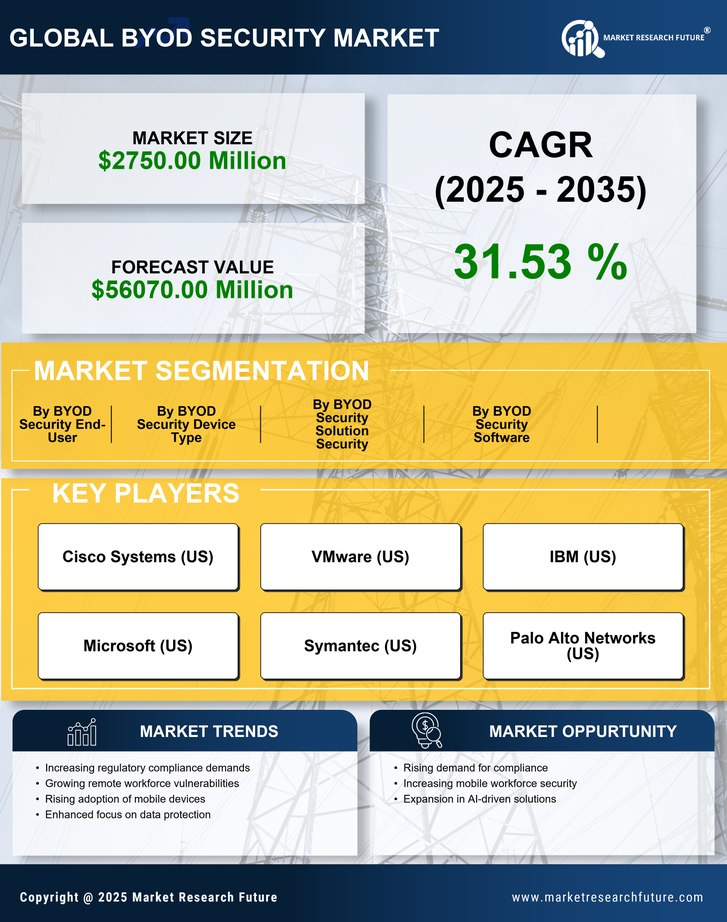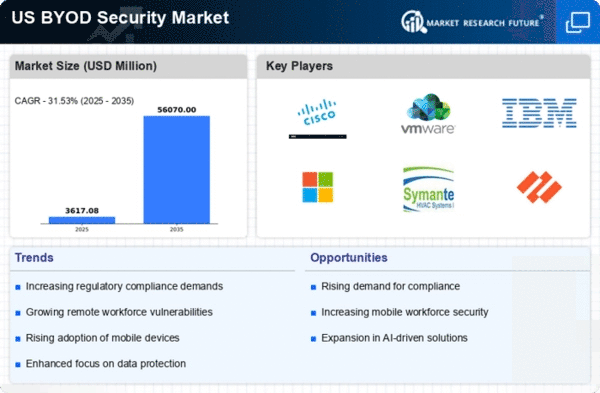Rising Cyber Threats
The byod security market is experiencing heightened demand due to the increasing frequency and sophistication of cyber threats. Organizations in the US are facing a surge in data breaches, with reports indicating that over 60% of businesses have encountered some form of cyber attack in the past year. This alarming trend compels companies to invest in robust security solutions to protect sensitive data accessed through personal devices. As employees increasingly utilize their own devices for work purposes, the risk of exposure to malware and phishing attacks escalates. Consequently, The BYOD security market is likely to expand as businesses seek to implement comprehensive security measures., including mobile device management and endpoint protection, to mitigate these risks and safeguard their digital assets.
Shift to Remote Work
The ongoing shift towards remote work arrangements has significantly influenced the byod security market. As more employees operate from home or other remote locations, the reliance on personal devices for accessing corporate networks has intensified. This trend has led to a growing recognition of the need for effective security protocols to protect sensitive information. According to recent studies, approximately 70% of organizations in the US have adopted some form of remote work policy, which has resulted in an increased focus on securing personal devices. The BYOD security market is poised for growth as companies invest in solutions that ensure secure access to corporate resources while maintaining employee productivity.. This shift necessitates the implementation of advanced security measures, such as encryption and multi-factor authentication, to safeguard data integrity and confidentiality.
Increased Regulatory Scrutiny
The byod security market is also being driven by heightened regulatory scrutiny surrounding data protection and privacy. In the US, regulations such as the California Consumer Privacy Act (CCPA) and the Health Insurance Portability and Accountability Act (HIPAA) impose stringent requirements on organizations to safeguard personal data. Non-compliance can result in substantial fines, prompting businesses to prioritize security measures for devices used in the workplace. As organizations strive to meet these regulatory demands, the byod security market is likely to witness increased investment in compliance-driven security solutions. This includes the implementation of data loss prevention tools and secure access controls to ensure that personal devices adhere to regulatory standards, thereby minimizing the risk of data breaches and legal repercussions.
Growing Awareness of Data Privacy
There is a notable increase in awareness regarding data privacy among consumers and organizations alike, which is influencing the byod security market. As individuals become more conscious of their personal information and its potential misuse, businesses are compelled to adopt stringent security measures to protect user data. Surveys indicate that over 80% of consumers in the US express concerns about data privacy, prompting organizations to prioritize the implementation of robust security frameworks. This growing awareness drives demand for solutions that not only secure devices but also enhance transparency in data handling practices. Consequently, the byod security market is likely to expand as companies seek to build trust with their customers by demonstrating a commitment to safeguarding personal information.
Technological Advancements in Security Solutions
Technological advancements are playing a pivotal role in shaping the byod security market. Innovations in artificial intelligence (AI) and machine learning (ML) are enabling organizations to enhance their security posture by automating threat detection and response. These technologies allow for real-time monitoring of devices and networks, significantly reducing the time taken to identify and mitigate potential threats. As businesses in the US increasingly adopt these advanced security solutions, The BYOD security market is expected to grow.. The integration of AI and ML into security frameworks not only improves efficiency but also provides organizations with the ability to adapt to evolving cyber threats. This trend suggests a future where security measures are more proactive and responsive, ultimately leading to a more secure environment for personal devices used in the workplace.

















